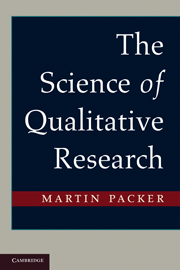Book contents
- Frontmatter
- Contents
- List of Figures and Tables
- List of Boxes
- Acknowledgments
- Introduction
- Part I The Objective Study Of Subjectivity
- Part II Ethnographic Fieldwork – The Focus On Constitution
- Part III Inquiry With An Emancipatory Interest
- 11 Qualitative Research as Critical Inquiry
- 12 Emancipatory Inquiry as Rational Reconstruction
- 13 Social Science as Participant Objectification
- 14 Archaeology, Genealogy, Ethics
- 15 A Historical Ontology of Ourselves
- References
- Name Index
- Subject Index
13 - Social Science as Participant Objectification
- Frontmatter
- Contents
- List of Figures and Tables
- List of Boxes
- Acknowledgments
- Introduction
- Part I The Objective Study Of Subjectivity
- Part II Ethnographic Fieldwork – The Focus On Constitution
- Part III Inquiry With An Emancipatory Interest
- 11 Qualitative Research as Critical Inquiry
- 12 Emancipatory Inquiry as Rational Reconstruction
- 13 Social Science as Participant Objectification
- 14 Archaeology, Genealogy, Ethics
- 15 A Historical Ontology of Ourselves
- References
- Name Index
- Subject Index
Summary
Bourdieu’s theory of practice is a systematic attempt to move beyond a series of oppositions and antinomies which have plagued the social sciences since their inception. For anyone involved in the social sciences today, these oppositions have a familiar ring: the individual versus society, action versus structure, freedom versus necessity, etc. Bourdieu’s theoretical approach is intended to bypass or dissolve a plethora of such oppositions.
Thompson, 1991, p. 11A second perspective on the kind of investigation that attends to the “objective framework” in which people live can be found in the work of French sociologist Pierre Bourdieu (1930–2002). For Bourdieu, we are always “playing a game” but are necessarily unaware of its arbitrary character. Everyday activity is the product of an interaction between what he called “habitus” and “social field,” a situated encounter between agents who are endowed with socially structured resources and competencies, and it is frequently the occasion for “symbolic violence” that critical inquiry must expose.
Bourdieu emphasized that the presuppositions Habermas insists we must examine are not matters of individual tacit knowledge. Like Kuhn, Bourdieu argues that the presuppositions are embedded in social practices and embodied in bodily habitus. Reflection will not expose them. We need to study material practices, and because scientific techniques themselves are practices of “objectification,” we need to objectify these techniques, turning them on themselves as instruments of reflexivity. Critical inquiry needs to be reflexive rather than reflective, and it achieves this by “objectifying objectification.” Reflexivity is also a matter of turning our instruments of objectification on ourselves. This means studying one’s own habitus together with the field in which one acquired it (where one grew up) and the field in which one applies it (the academy).
- Type
- Chapter
- Information
- The Science of Qualitative Research , pp. 316 - 341Publisher: Cambridge University PressPrint publication year: 2010



